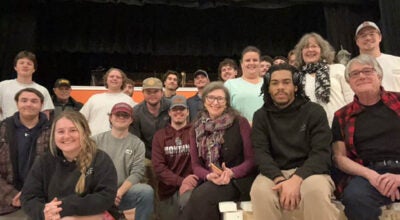H-SC students learn about ISIS during Current Event Series Talk
Published 11:01 am Thursday, December 10, 2015

- Lt. Gen. Gerald Boykin
By Greg Eanes
Special to The Herald
In the days following the terrorist attacks in Paris, Hampden-Sydney College students had an opportunity to learn about ISIS and the global threat they pose to world peace during a lecture part of the Current Event Series of talks sponsored by the Wilson Center for Leadership in the Public Interest.
The discussion was led by Dr. Warner R. Winborne, associate professor of government and foreign affairs and Lt. Gen. Gerald Boykin, USA (Ret), the Wheat Visiting Professor in Leadership at Hampden-Sydney College, former undersecretary for Defense Intelligence and a former member of the U.S. National Security Council Policy Coordinating Committee for Terrorism.
The two addressed ISIS activities, ISIS theological motivations and the threat to global stability.
ISIS ‘Caliphate’ – the state
“ISIS surprised me in Paris, but perhaps they shouldn’t have,” Winborne said. His assessment was that ISIS was trying to consolidate its territorial gains and “act as a state yet their apocalyptic vision appears to be pulling them in two directions” leading to continued mass terror attacks such as Paris. He and Boykin agreed that ISIS has created a “caliphate” and are trying to grow it.
ISIS has taken actions that are consistent with the actions of an independent state he said, noting such actions as capturing and holding territory, governing a population in that territory, raising an army and raising taxes to fund that army.
Winborne spoke of a slick, professionally developed online monthly magazine ISIS uses for recruiting. He displayed advertisement screenshots illustrating ISIS appeals to Muslim Chinese Uyghurs, inviting them to Iraq to join as fighters and another ad showing a dead fighter, appealing to their belief in Jihadi martyrdom. Another appeal was for Muslims with medical training, soliciting them to come to the ‘caliphate’ to help set up medical training facilities. Winborne said the concept of appealing to Muslims to “abandon the land of the Shirk” (non-Islamic countries) to get into a land governed by Islamic Sharia law has its roots in 13th Century Islamic religious writings.
He also said ISIS has money problems in that it spends more than it makes, noting their military operations are assessed to cost $350 million annually. He noted they’ve been earning $100 to $300 million a year because they control nine oil fields. They also get money from donations, ransoms, taxes imposed on people in those territories and bank robberies. When they take over an Iraqi town, they seize the bank and take the money and reportedly took in over $400 million when they seized the banks in Mosul.
From a state perspective, he said they have no tax infrastructure or the administrative talent needed to run a government.
The philosophy
Winborne noted that ISIS is “trying to bring about the end of the world.” They believe that the “infidels will attack and God will smite them.”
He showed an ISIS magazine cover that had the ISIS black flag flying in St. Peter’s Square at the Vatican.
“Everyone in the west are infidels,” Winborne said noting they “relish” the torture of non-Islamic people with beheadings, drownings and immolations and these things are depicted in their propaganda.
Boykin noted ISIS propaganda is clear in its messaging: “‘We have established a caliphate and we are growing.’” He said, “Whether Sunni or Shia, the goal is to have a caliphate.” He said the establishment is necessary “for their messiah” — the Mahdi — to return and govern.
“They are a theocracy,” Boykin said. “They are motivated and subservient to a religious ideology.” He said they are theologically no different than Al-Qaida but their tactics are different noting “they kill people for shock effect and put it on YouTube. Young Jihadis are drawn to that. Over 200 people from the U.S. have gone to fight with ISIS and over 40 have returned. They’re running to the guns and they do things like they did in Paris. It has tremendous propaganda effect and helps their recruiting and funding.”
ISIS in America
Boykin said there are known ISIS members in the U.S. noting most of them have entered through the America’s southern border. He said though that the U.S. intelligence and law enforcement communities “are doing a good job in identifying the threats,” which has been critical to interdicting ISIS plots.
Boykin said, “You cannot underestimate the long term damage” that can be created by ISIS and ISIS-like organizations. He said the Muslim Brotherhood is in America “and they created terrorism” as it is known today citing former Muslim Brotherhood member and Egyptian President Mohammed Morsi who joined as a student at California State Polytechnic University. Boykin said, “We’ve got to take it seriously.”
He critiqued both the George W. Bush and Barack Obama administrations saying, “Neither administration reached out to non-Jihad Muslims. They only reached out to CAIR and 252 other [fundamentalist] organizations. We got it backward. If we don’t get it straight, I think we’re going to pay a huge price.”
Winborne said, “Islamic radicalism has be handled within the Islamic community and I’ve seen very little action here.”
Presidential
performance
Both Winborne and Boykin commented on Obama’s handling of Middle East challenges.
Winborne said. “I’m deeply disappointed in [Obama’s] record on Foreign affairs. It’s like it is a distraction to him. He pushes foreign affairs away … He uses diplomacy as a tool to placate and redirect the ire of other countries so he can focus on his domestic agenda. His foreign policy is feckless by design. This is leadership from behind.”
General Boykin said, “It seems U.S. policy makers are making bad steps…the [George W.] Bush Administration didn’t get it either. Obama seems to have no strategy and it’s caused us to lose a tremendous amount of esteem. Bush did not deal with al-Qaida effectively. I don’t know Obama’s reasons unless that he’s surrounded himself with the wrong people.”
He noted Obama has killed more terrorists with drone strikes than Bush and commended Obama for being “willing to pull the trigger” when solid information was available.
Potential solutions
Boykin noted there’s no military solution to the problem because it is ideology.
Military force “will not destroy the theology. We have to use all elements of national power.” These include diplomatic, informational, military and economic activities as well as law enforcement.
Except for Special Operations Forces, Boykin does not advocate U.S. ground troops to eliminate ISIS. He stated the Saudi Arabians and other Sunni Arab states have more at stake than the U.S. adding, “If the Saudi Arabians are not going to step up then our boys shouldn’t do it. Saudi Arabia needs to step up. They’re the next target. I don’t think Americans should do it.”
Boykin also advocated arming and equipping the Peshmerga, the paramilitary force of the Kurdish region in northern Iraq. He said, “One of the things we ought to do immediately is to land planes in Irbil and equip them to defend themselves.” He said equipment for the Kurds currently has to run through Baghdad and never gets there. The Kurdish people’s traditional homeland overlaps northern Iraq, Turkey, Syria and Iran.
“Joe Biden was right,” Boykin said in regards to Kurdistan. “We need to divide Iraq. There needs to be a Kurdistan to allow them to be a sovereign state. It can be confined to Iraq’s border and we can declare them a sovereign territory. The Turks will object.”
Winborne concurred with Boykin stating, “I’m increasingly in favor of a Kurdish state.”
Winborne also noted, the West can interfere with ISIS’ ability to recruit by interrupting the flow of funds, in part by destroying the oil fields, prevent the immigration of professionals and other educated technicians and facilitate the emigration of the region to safe zones. “You’ll never be able to negotiate with ISIS,” he said.






